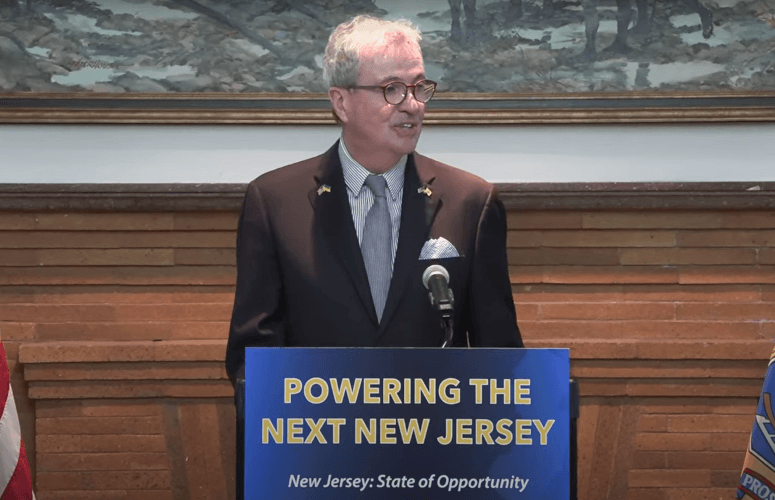[ad_1]

Environment
By Anthony Birritteri, Editor-in-Chief On Feb 15, 2023
Gov. Phil Murphy today outlined six climate change initiatives, three already adopted through Executive Order, that will greatly impact businesses and homeowners. From moving the state’s 100% clean-energy target ahead by 15 years – from 2050 to 2035 (EO 315), to setting a target to install zero-carbon-emission heating and cooling systems in 400,000 homes and 20,000 commercial properties by 2030 (EO 316), Murphy said that of all the challenges the state is facing, “perhaps none is as existential than the challenge we face from climate change.”
Speaking at Rutgers University’s New Brunswick campus, the governor first outlined many of his administration’s environmental achievements over the years, but added, “At no point have we taken our eyes off the need for strong and forward-looking solutions.”
Following California’s mandate, Murphy said he will motivate and support the electric vehicle market with reforms that will help ensure that, by 2035, new cars sold in the state will all be zero-emission vehicles.
His administration will also use $70 million of the state’s proceeds from the Regional Greenhouse Gas Initiative (RGGI) to fund local-government purchases of all-electric medium- and heavy-duty trucks and associated charging infrastructure.
The governor said these moves are being made “because the single-greatest source of greenhouse gas emissions in our state are cars and trucks.”
Because the state has a goal of installing more zero-carbon emission heating and cooling systems in homes and businesses, Murphy said his administration will work side-by-side with the state’s natural gas utilities “to tackle the tough questions and put forward a comprehensive plan for a future less reliant on the burning of fossil fuels.” This is being done through EO 317, which initiates a process in partnership with utility companies, key stakeholders including organized labor, and the New Jersey Board of Public Utilities (BPU) to plan for the future of the natural gas utility in the state.
Taking a cautious view concerning the financial impact of these initiatives, Ray Cantor, deputy chief government affairs officer of the New Jersey Business & Industry Association, commented, “There is nothing wrong with trying to reduce carbon emissions, and we support cleaner energy, as well as the opportunity to create jobs. However, in mandating an energy transition in such a short time range, we should know – from the start – what the overall, actual costs will be for New Jersey residents or the feasibility of such aspirational goals.”
Questioning the goal of 100% clear energy status by 2035, Cantor said that New Jersey’s current Energy Master Plan (EMP), which set that status for 100% clean energy by 2050, has no real answers as to its actual costs or feasibility over the years.
“The fossil fuels that the EMP seeks to fully replace are the basis of New Jersey’s and the world’s energy supply, using infrastructure that has been built up for over a century,” Cantor said. “The all-electrification policies the administration seeks ignores or discounts other options for carbon reduction that will develop over time, such as hydrogen, renewable natural gas and other emerging technologies. While we support our wind and solar industries, we cannot decarbonize our electricity sector by renewables alone.”
While PSEG Chair, President and CEO Ralph LaRossa commended the governor’s vision for a clean energy future, he said that, “As we manage the impacts of climate change, it is imperative that we work together to decarbonize and transition to the energy systems of tomorrow while continuing to prioritize reliability and affordability. Clean energy, electrification of transportation and the continued modernization of infrastructure can expand economic growth, foster the diverse workforce of tomorrow and provide equal access for all to these benefits – regardless of geography or economic circumstances.”
For a copy of Executive Order No. 315, click here.
For a copy of Executive Order No. 316, click here.
For a copy of Executive Order No. 317, click here.
To read the NJBIA statement, click here.
To access more business news, visit NJB News Now.
Related Articles:
[ad_2]
Source link



